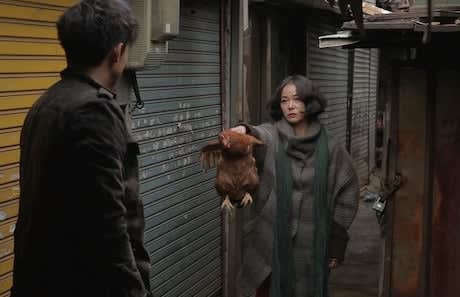Divisive for its taboo subject matter and seamy tone, Kim Di-Duk's oedipal revenge thriller hews closer to the art house than the grindhouse, but packs a psychological punch more disconcerting than any degree of graphic physical violence could hope for. The prolific South Korean auteur addresses the concept of mercy against the harsh socio-economic backdrop of debt-ridden machine shop workers in an impoverished sector of Seoul. We follow loan enforcer, and doom for irresponsible borrowers, Kang-do (Lee Jung-jin) through a forced emotional awakening of sorts when a woman claiming to be his long-lost mother interrupts his routine of callously maiming and beating tardy customers. If his dead-eyed demeanour doesn't drive it home that this is a man who's never felt love, his daily ritual of throwing his favourite knife at a drawing of a topless, vaguely maternal woman cements the idea well before Min-Soo (Cho Min-soo) arrives. When she refuses to stop trying to nurture him, the initially sceptical Kang-do puts the mystery woman through a series of increasingly extreme tests, ostensibly to prove the veracity of her claim, but mostly because he's been mentally deranged by a life without affection. It's more than a little uncomfortable to watch, though Kim tastefully shoots the most disturbing bits with restraint. Complaining that the thoughtful director is simply out to shock and provoke is a cop-out for viewers (and critics) unwilling to consider the nuanced emotional interplay between the brave, committed leads. Pieta isn't exactly subtle, but it has a great deal to say about desperation, guilt and the extremes to which people will go to protect and provide for their family. Those willing to invest the attention and stomach some troubling expressions of depravity will be rewarded with consistently fantastic performances from the stars and distinctly realized side players alike, and a story as sad and touching as it is unsettling. Anyone who's watched a ton of special features will enjoy the refreshingly frank commentary from Kim, Cho and Lee, in which the director and his two leads debate the merits of depicting graphic realism, taunt each other with probing sex talk and dissect the intent behind every decision in great detail. Two sets of interviews with the same three are equally candid, making a great cheat sheet for anyone confused about what they just saw. In contrast, "Filmography of Kim Di-duk" is nothing more than a quick rundown of the director's prior efforts and an equally brief, by now redundant, interview. Even without special features, Pieta is essential for any fan of the particular harsh histrionics of South Korean cinema.
(Mongrel Media)Pieta
Kim Di-Duk

BY Scott A. GrayPublished Aug 10, 2013



